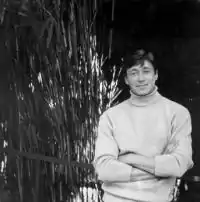Georgy Rerberg
Georgy Ivanovich Rerberg (Russian: Георгий Иванович Рерберг, September 28, 1937, Moscow, Soviet Union, – July 28, 1999, Moscow, Russia) was a Soviet cinematographer.[2]
Georgy Rerberg | |
|---|---|
 | |
| Born | Georgy Ivanovich Rerberg 28 September 1937 |
| Died | 28 July 1999 (aged 61) |
| Resting place | Vvedenskoye Cemetery |
| Years active | 1965–1997 |
| Title | People’s Artist of the RSFSR (1988) |
| Spouse | Valentina Titova.[1] |
| Awards | Vasilyev Brothers State Prize of the RSFSR (1990) |
He is known for his work on Andrey Tarkovsky's Mirror. He was initially the cinematographer for Andrey Tarkovsky's film Stalker but was later replaced by Alexander Knyazhinsky.[3]
Rerberg's notable portfolio of two dozen films includes works by world-renowned Russian directors such as Andrei Konchalovsky, Andrei Tarkovsky, Igor Talankin, Sergei Solovyov, Ivan Dykhovichny, and Abderrahmane Sissako.
Georgy Rerberg was the grandson of the Russian civil engineer and architect Ivan Rerberg.
Selected filmography
- The Story of Asya Klyachina (1960)
- The First Teacher (1965)
- A Nest of Gentry (1969)
- Uncle Vanya (1970)
- Ilf and Petrov Rode a Tram (1972)
- The Mirror (1975)
- Melodies of a White Night (1976)
- Father Sergius (1978)
- Stalker (1979)
- Time for Rest from Saturday to Monday (1984)
- Plumbum, or The Dangerous Game (1987)
- Octobre (1993)
References
- Fyodor Razzakov (2007). The Light of Faded Stars. Moscow: Eksmo. ISBN 978-5-699-20983-5.
- Peter Rollberg (2016). Historical Dictionary of Russian and Soviet Cinema. US: Rowman / Littlefield. p. 609. ISBN 978-1442268425.
- "Режиссёр Игорь Майборода рассказал о подробностях конфликта между Тарковским и Рербергом" (in Russian). Российская газета. June 24, 2008. Archived from the original on December 2, 2012. Retrieved February 17, 2013.
External links
- Georgy Rerberg at IMDb
- Георгий Рерберг. «Если чувства не воспитаны, толку не будет». Последняя беседа.
- Георгий Рерберг — Марианна Чугунова — Евгений Цымбал. Фокус на бесконечность. Разговор о «Сталкере» (1997). Iskusstvo kino 2006, #4.
This article is issued from Wikipedia. The text is licensed under Creative Commons - Attribution - Sharealike. Additional terms may apply for the media files.